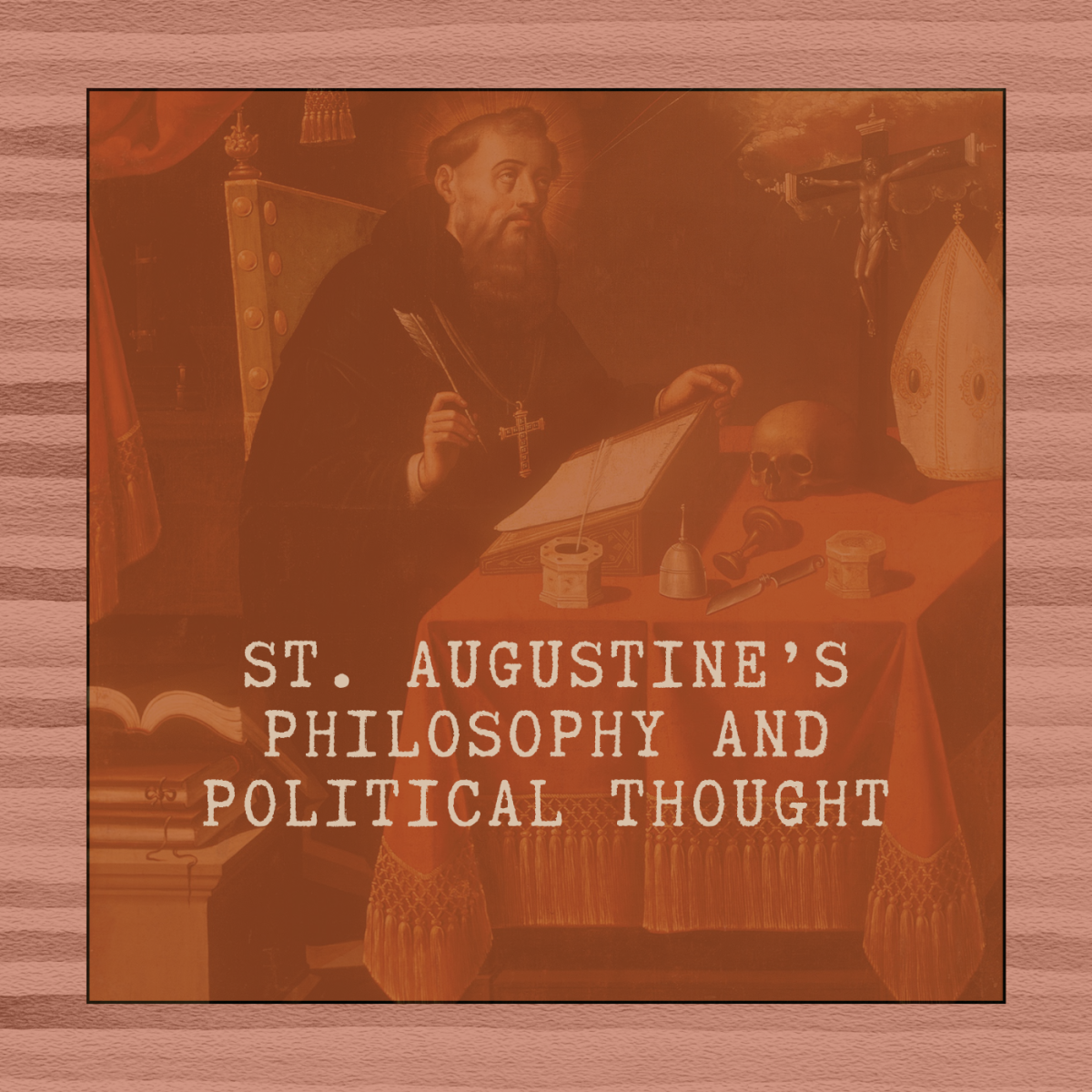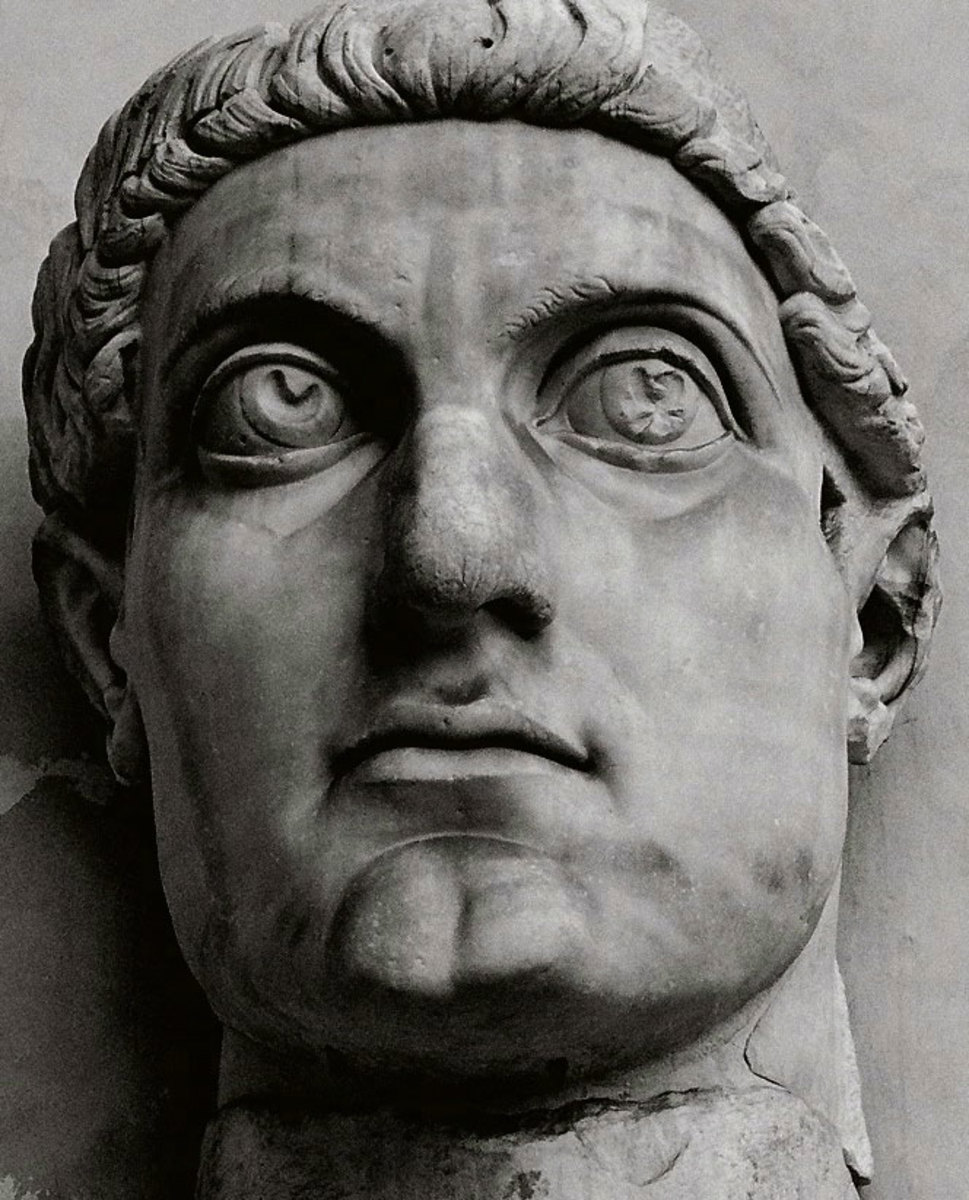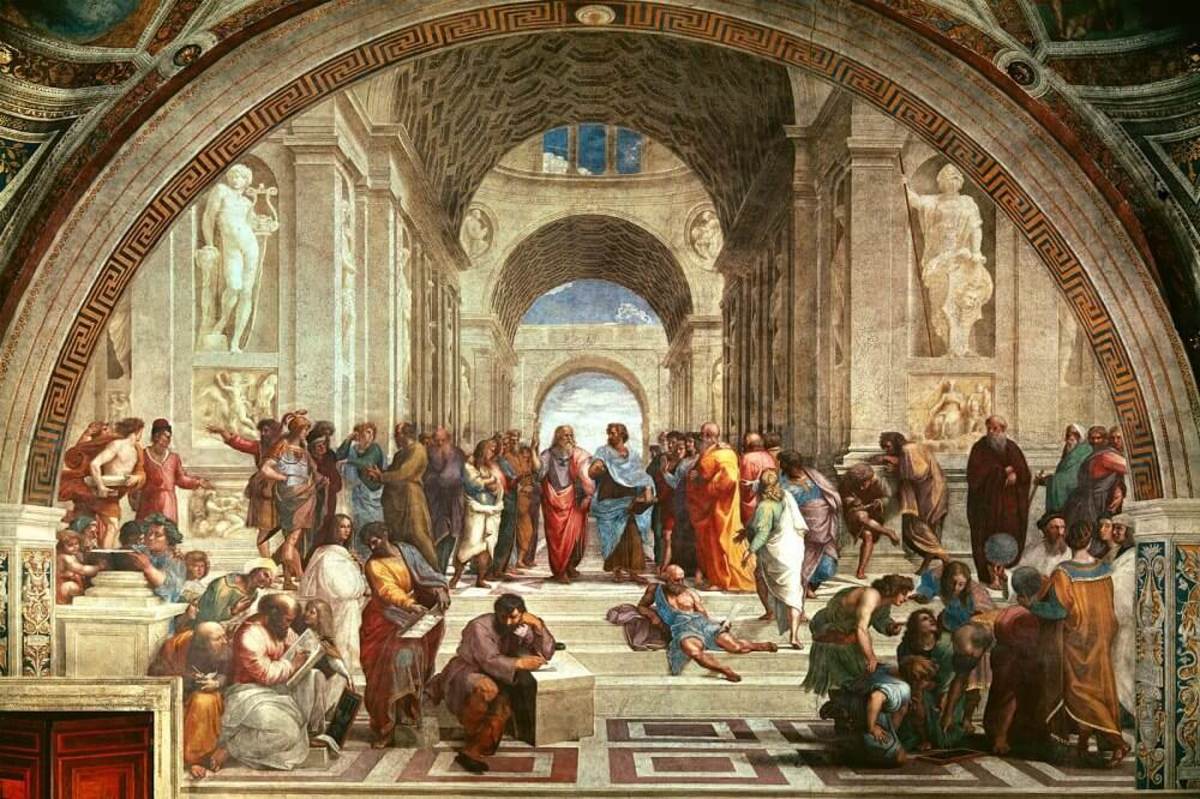St. Augustine and his philosophical concepts
St. Augustine
St. Augustine started out as a very elegant young leader, but also did some awful things. He drank, gambled, and went to go see prostitutes. His mother tried to make him a Christian because at the time he did not believe in the Lord. Augustine then became Manichaean. One year later he went to Milan where he would meet Bishop Ambrose and learn to study Plato. Augustine began to think that Manichaean was not suitable to what he wanted and Plato's philosophy was more understandable. With Monica’s love and Ambrose's message, Augustine changed his life by getting married and later on baptized.
From the very beginning when Augustine first met Ambrose he started to question Christianity. Augustine and his mother started to visit Ambrose, on a regular basis, at his house. On top of that Augustine was so remotely interested that he attended Sunday Mass just to hear Ambrose teach the word. Significantly, when Augustine turned the age of thirty three he was baptized by Ambrose and would go on to become the bishop of Hippo.
Yes, I believe from personal experience that one person can make an impact on the spiritual like of another person. An example would be my school life. When I was about ten or eleven I didn't want to go to school and have a temper tantrum until my parents let me stay home. My sister impacted my life immensely. She brought me to the soup kitchen with my parents and took me out of the bad crowd of kids that I used to hang around with. She taught me that how I wouldn’t want to be here when I get older and school was that only way out. Ever since that day, I have become to know the Lord and attend church every Sunday.
Augustine was born in a region of North Africa in an area called Roman Africa because of its language being Latin and Roman customs. His mother's name was Monica and she was apart of the Christian faith. His father was pagan and a Roman Official who had passed away early on in Augustine's life. Augustine's childhood sin was that he visited prostitutes, drank alcohol, and gambled often. Augustine was taught in Northern Africa but didn't lead a life one would think of. He missed school for a year and got into his terrible non-Christian like habits. Augustine believed in Manichaeism where one god created good and another created evil. As a result the believers were not accountable for the sins that they commit. When Augustine became a Manichee he was furious and attacked the church. One of his important events was in the Garden of Milan, Augustine witnessed a revelation. Distantly, he heard children singing, “Take it and Read it” referring to the bible. So Augustine proceeded towards the bible and picked it up. He then opened the bible and turned to a random passage of Romans. The passage included teachings from Paul which helped to clear up his confusion. The troubles of Augustine's early life shouldn’t be seen because what really matters is the goodness in side himself. He was a complex and immoveable man early on, but overcame his faults and became to know the Lord and further his understanding of Christianity by becoming a well known saint today for all the great things he had accomplished.
Saint Augustine’s powerful prayer to God tells the story of his struggles that led towards his conversion to Christianity. This journey toward Christ was difficult for Augustine, as it required him to overcome his misunderstanding of evil and his own sin. In Augustine’s adolescents, a strong desire for lust overtook his life, not only hurting him spiritually, but also hurting the one woman who supported his conversion, his mother Monica. Upset and looking for repentance in all his wrongdoings, Augustine wanted to begin a spiritual journey toward God, though he was not exactly sure who God was. He learned of different forms of evil and sin through his recollection of his infancy and youth, his study of the Manichean religion, Neoplatonist doctrines, and finally his conversion to Christianity. Augustine’s study of the different concepts of evil and sin prepared him for his conversion and his influential role in the Christian religion.
Augustine’s struggles take many forms throughout the Confessions. The reader frequently finds Augustine internally struggling with God by asking difficult, philosophical questions. The answer to Augustine’s question of what the seed of evil is, is revealed in Book VII and develops throughout the prayer. The translator of the Confessions, Henry Chadwick, tells of the different forms of evil throughout the prayer stating, "Therefore 'evil' is not being but a lack of it, a deficiency inherent in having been placed on a lower step that higher entities. Since to exist is for a Platonist to be a ‘substance’, evil has no ‘substance’." Chadwick is describing both the Manichean and that Platonist view of evil. Both of these views in the prayer provoke Augustine’s interest to study more about both religions. After Augustine’s conversion to Christianity, he learns that evil is the result of the misuse of free choice through rational thinking.
Augustine created a theology of the self in The Confessions, and in The City of God he initiates a theology of history. He uncovers a wide-ranging explanation of history that begins with creation itself, moves through the turmoil and upheaval of man-made states (the City of the World), and continues to the realization of the kingdom of God (the City of God). In effect, The City of God is a completion of the project he began in The Confessions, where he traced the progress of the self toward completion in God. Likewise, human society finds completion in the realm of God. Along with a theology of history, Augustine seeks to put together a Christian philosophy of society. In other words, he gives the various areas of philosophical inquiry, such as ethics and politics, a unity in the universality of divine revelation. History completes itself in divine law. The philosophers of the past, such as Plato, had all said that a person does not owe full and absolute loyalty to any earthly society, and Augustine rigorously critiques this concept in the light of Christian doctrine. He states that the Scriptures alone can instruct human beings about the highest good and the highest evil and that without this guidance, human endeavor has no purpose.
Augustine presents the four essential elements of his philosophy in The City of God: the church, the state, the City of Heaven, and the City of the World. The church is divinely established and leads humankind to eternal goodness, which is God. The state adheres to the virtues of politics and of the mind, formulating a political community. Both of these societies are visible and seek to do good. Mirroring these are two invisible societies: the City of Heaven, for those predestined for salvation, and the City of the World, for those given eternal damnation. This grand design allows Augustine to elaborate his theory of justice, which he says issues from the proper and just sharing of those things necessary for life, just as God freely distributes air, water, and light. Humankind must therefore pursue the City of Heaven to maintain a proper sense of order, which in turn leads to true peace.
In "theory on time", Augustine seeks to answer the question: If God is eternal, how can he live exist in a time bound universe? Augustine solved this problem by stating that God does not exist in time. He argues that God created time when he created the world, and that only humans can conceive of time. Thus, according to Augustine, God lives in a different world were time does not exist. This solves the first half of the problem; the second half, however, deals with how time functions in the universe we live in.
To understand Augustine's argument we need to depart from the beliefs we have about time. Augustine talks about time as though it were a concept that can be measured and sensed. Thus when he talks about time he is talking about something that exists. Thus, for example, we will say we see a green chair until we no longer see the chair. Just as we can use our five senses, Augustine feels that humans believe we can measure time. Yet rationalizing how we can measure time is not so easy. He goes on to argue that we do not measure time as easily as we can see a green chair. Augustine believes that time intervals do not exist. Rather, that we understand time through memory (past), attention (present), and expectation (future). This is his answer to how we can understand time, although he is not too convinced about it.
The philosophy of sexuality, like the philosophy of science, art or law, is the study of the concepts and propositions surrounding its central protagonist, in this case `sex'. Its practitioners focus on conceptual, metaphysical and normative questions. Conceptual philosophy of sex analyses the notions of sexual desire, sexual activity and sexual pleasure. What makes a feeling a sexual sensation? Manipulation of and feelings in the genitals are not necessary, since other body parts yield sexual pleasure. What makes an act sexual? A touch on the arm might be a friendly pat, an assault, or sex; physical properties alone do not distinguish them. What is the conceptual link between sexual pleasure and sexual activity?
The philosophy of sex investigates conceptual, metaphysical and normative questions, although the boundaries between these three are hardly firm. Metaphysical and normative philosophy of sex is well developed, stretching back to Plato and Augustine; sexual ethics has a famous history, and the contemplation of the place of sexuality in human nature is central to Christianity. The analysis of sexual concepts, by contrast, is in its infancy. The subjects of analysis are these core concepts and the logical relationships among them: sexual desire, sensation, pleasure, act, arousal and satisfaction. In light of sexuality's intricate psychology and far-reaching consequences, sexual activity might be justifiable only by weighty nonsexual considerations. Consider the hostility of Christianity to sex, as in Augustine's De nuptiis et concupiscentia (On marriage and Concupiscence), where we hear the strains of Plato's Phaedrus: "A man turns to good use the evil of concupiscence ... when he bridles and restrains its rage and never relaxes his hold upon it except when intent on offspring, and then controls and applies it to the carnal generation of children not to the subjection of the spirit to the flesh in a sordid servitude."
According to St. Augustine, in order to discover what is natural in human sexuality we should emphasize what humans and lower animals have in common we need to apply this formula, the purpose of sexual activity and the sexual organs in humans is procreation, as it is in the lower animals. Everything else follows more-or-less logically from this. To discover what is distinctive about the natural human sexuality, and hence derivatively what is unnatural or perverted, we should focus, instead, on what humans and lower animals do not have in common. We should emphasize the ways in which humans are different from animals, the ways in which humans and their sexuality are special. The ethics of sexual behavior, as a branch of applied ethics, is no more and no less contentious than the ethics of anything else that is usually included within the area of applied ethics. Think, for example, of the notorious debates over euthanasia, capital punishment, abortion, and our treatment of lower animals for food, clothing, entertainment, and in medical research. As far as I can tell by surveying the literature on sexual ethics, there are at least three major topics that have received much discussion by philosophers of sexuality and which provide arenas for continual debate.
References:
Diarmaid MacCulloch, (2005), "The Reformation: A History"
Saint, Bishop of Hippo Augustine, J. M. Lelen, and J. M. Leleu, (1997), "Confessions of Saint Augustine: Revision of the Translation of Rev. J.M. Lelen"
Augustine of Hippo and Henry, (2003), "City of God"








